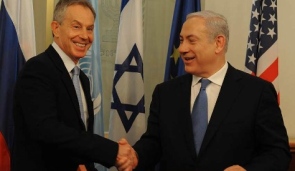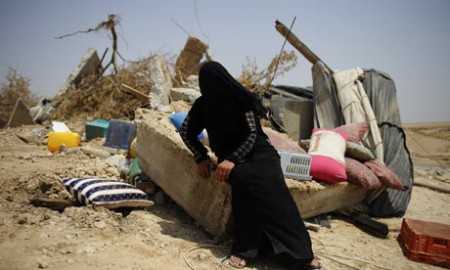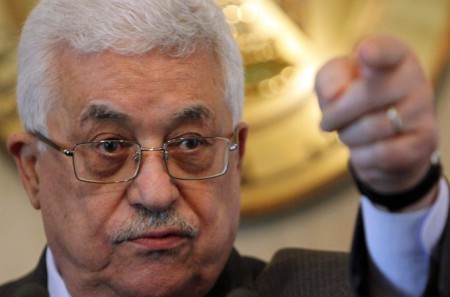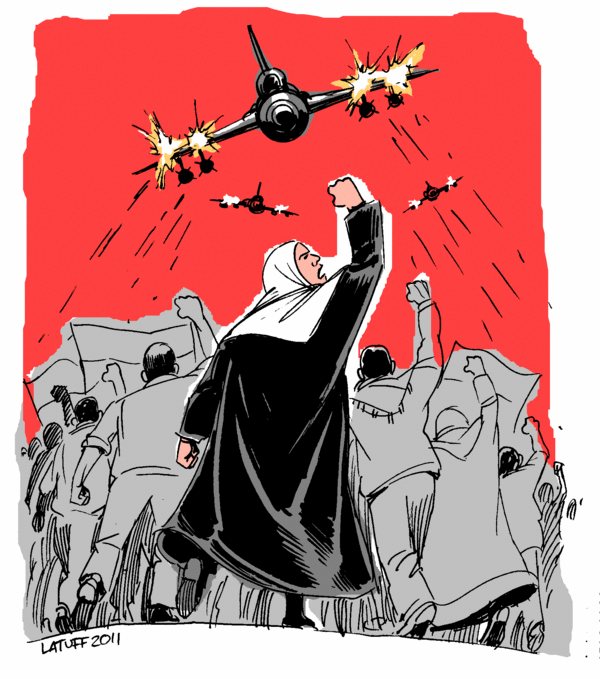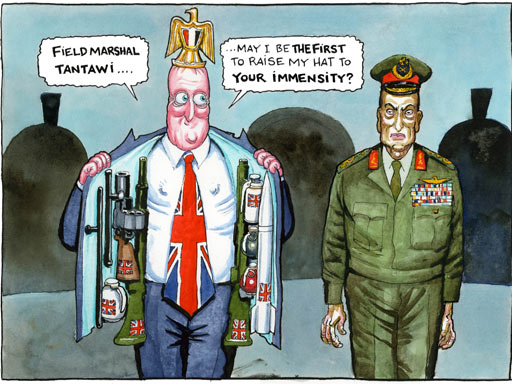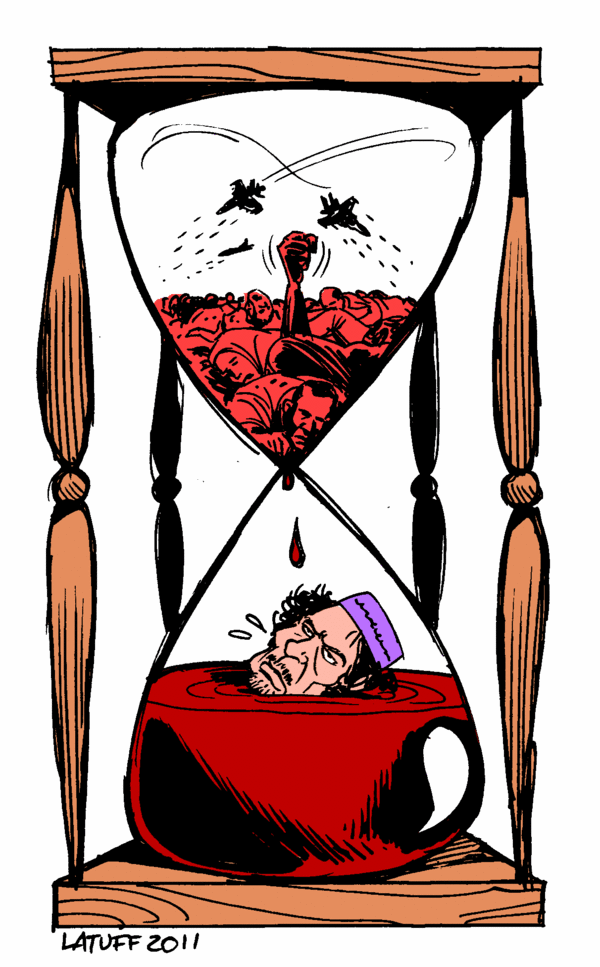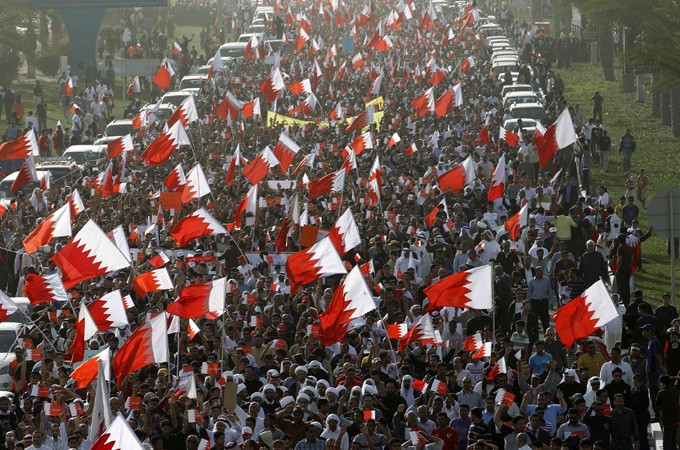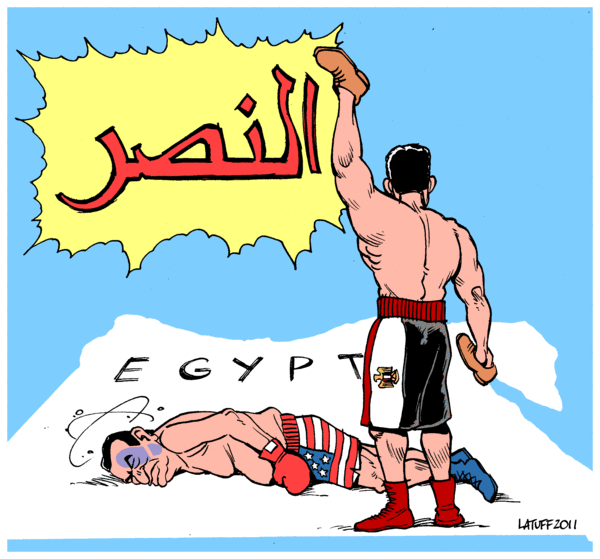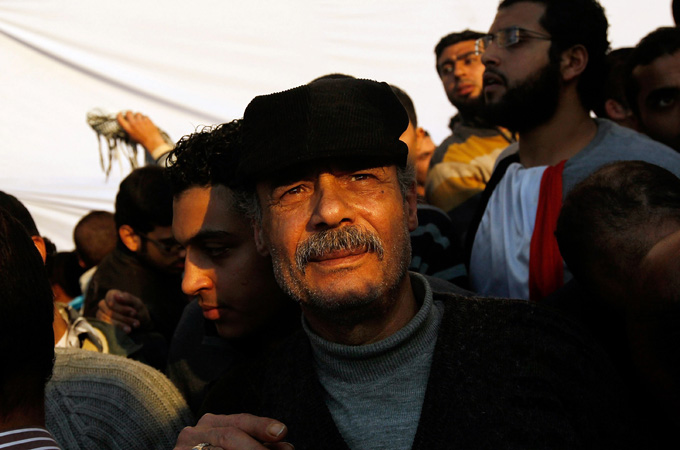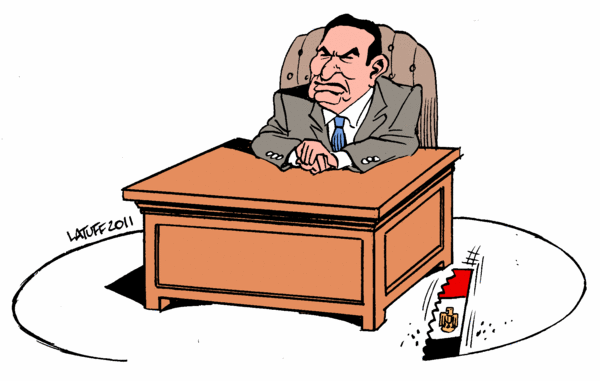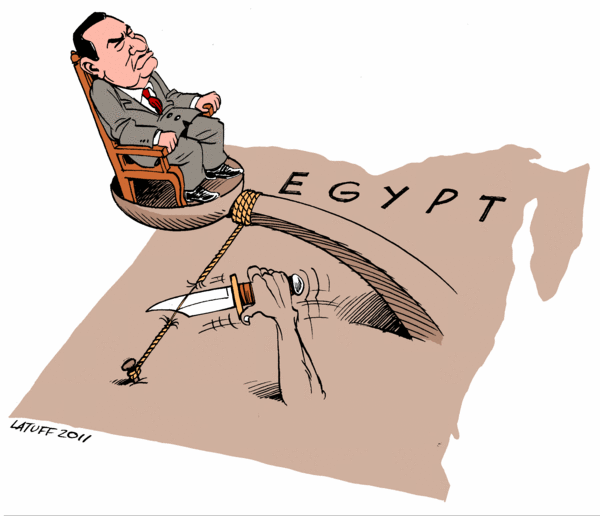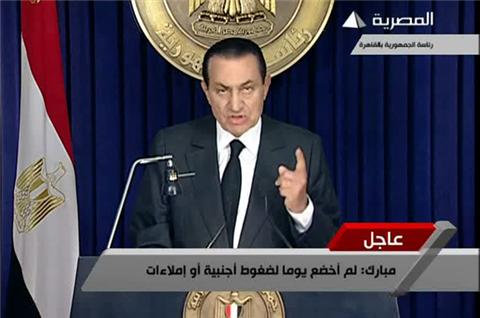EDITOR: Good day to bury bad news
With the world taken with the tragedies in Japan and Libya, not to mention the revolt ongoing in other parts of the Arab world, this seems to Israel an excellent time to punish Gaza cvilians again. You have to ask yourself – do they really want children hurt, bearing in miond they keep singing the praises of their super-accurate weapons? Maybe they do. After all, it is punishment they mete out.
Or maybe they just think children in Gaza are just naturally part of the Hamas fighters. And please do not forget the booksellers, they are also very dangerous, as yoiu shall find out in one of the pieces below.
An interesting fact evident below – in the Guardian report there are no dead in Gaza, only ‘wounded’. The BBC reported 4 dead, and in Al Jazeera the real figure is reported, nine dead. All websites were checked at the same time…
Eight dead in Gaza in Israeli mortar attack: Al Jazeera English
Victims include children and armed fighters, as raids continue in the Gaza Strip.
Last Modified: 22 Mar 2011
”]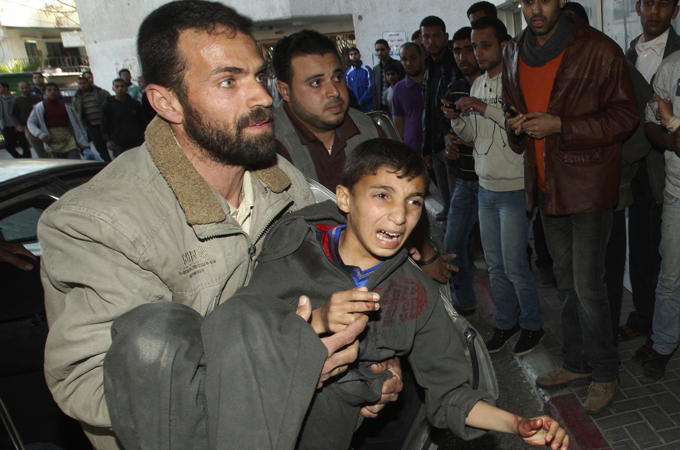
At least eight Palestinians, including children, have been killed in a Israeli raids in the Gaza Strip.
The deaths occurred in two separate attacks on the eastern part of Gaza City on Tuesday, witnesses said.
Two of the dead were aged 11 and 16, and four of them were from the al-Quds Brigade, the armed wing of the Islamic Jihad movement.
Four people died when a shell slammed into a family home in Shejaiya, medical sources told AFP news agency. Several hours later, another four were killed – all of them fighters – in an air raid in the nearby Zeitun neighbourhood.
On Tuesday, the military said it was responding to rocket attacks from Gaza. They also confirmed it had fired mortar rounds towards the eastern outskirts of Gaza City on Tuesday, shortly after four rockets hit Israel, and expressed “regret” over reports that civilians had been hurt.
It was the third time Shejaiya had been targeted on Tuesday, following an earlier one which wounded one fighter and a burst of tank fire, which left two civilians wounded shortly after dawn.
Al Jazeera’s Bernard Smith, reporting from Gaza, said that more tit-for-tat attacks may be expected.
“Tensions look to be rising here, and violence could increase,” he said.
The latest incident also comes after at least 19 people were wounded in a series of raids on Monday, in the northern town of Beit Lahiya and Gaza City.
Witnesses said a security compound for Hamas, which controls the Gaza Strip, a training camp north of the city and a brickworks and metal foundry in northern Gaza were among the targets.
Rising cross-border violence has occurred, also increasing tensions between Israel and Hamas and once again raising fears of another large-scale Israeli invasion.
Israeli air strikes wound 19 in Gaza: The Guardian
Seven Palestinian children among those hurt in raids retaliating against Hamas rocket attacks
The Israeli military confirmed one of the raids, saying several Hamas-affiliated militants were targeted in northern Gaza. Photograph: Mohammed Abed/AFP/Getty Images
At least 19 Palestinians were said to have been wounded in the Gaza strip as a result of air strikes launched by Israel on Monday after militants launched mortars and rockets into Israeli territory.
Among the wounded were seven children, two women and four militants, according to officials from Hamas, the Islamist group that controls Gaza.
Hamas has stepped up rocket fire at Israel after a lengthy hiatus since the war of two years ago, claiming responsibility for the firing of more than two dozen mortars and rockets at the weekend.
The Israeli military confirmed one of the air raids, saying that several Hamas-affiliated militants were targeted in northern Gaza, as well as a tunnel used to smuggle weapons.
Witnesses in Gaza said Israeli warplanes fired a missile after three mortars were shot at Israel, and the Israeli missile landed harmlessly in a bin for animal feed.
Israel fired four other missiles at as many targets later in the evening, aiming at a Hamas security compound in Gaza City, a training camp north of the city, and a brickworks and metal foundry in northern Gaza, witnesses said.
Hamas fired two rockets into southern Israel on Sunday, a day after Palestinian militants fired more than 50 mortar shells into Israel in the the heaviest Palestinian barrage since a major Israeli military offensive in Gaza two years ago. In the evening, militants in Gaza fired another rocket into southern Israel, exploding near the city of Ashkelon. No one was hurt.
Medical officials in Gaza said on Sunday that the bodies of two Palestinian men who were killed overnight along the border had been recovered. The Israeli military said soldiers spotted two Palestinians crawling towards the border with what appeared to be a bomb. Soldiers called on them to stop, and opened fire after they continued moving.
Most rocket attacks from Gaza since the invasion have been carried out by small militant groups, although Hamas claimed responsibility.
Children die in Israeli attack on Gaza, say doctors: BBC
Several Palestinians were also injured in Tuesday’s attack
Four Palestinian family members, including two children, have died in Gaza, in an Israeli artillery strike.
Another 12 people were wounded when an Israeli tank shell hit a home on the eastern outskirts of Gaza City.
Israeli Defence Minister Ehud Barak said it was an unfortunate mistake, but added that was “the price of dealing every day with the terrorists”.
In a second attack, three people – all members of Islamic Jihad – were killed during an air strike, medics said.
On Saturday, Palestinian militants fired a barrage of rockets over the frontier, prompting Israeli retaliation.
The BBC’s Jon Donnison, in Gaza City, says the exchanges are among the most serious since Israel’s major offensive in the coastal strip between December 2008 and January 2009.
Our correspondent adds that, unusually, the militant wing of Hamas claimed responsibility for at least a dozen of the mortars fired at Israel over the weekend.
In Tuesday’s first attack, a grandfather and two of his grandchildren were among those killed when artillery was fired at a house, reports said.
Witnesses said they were playing football when they died.
The Israeli defence minister said: “We were not glad of it but that’s the price of dealing every day with the terrorists attacking our civilian population from within civilian population on the other side.”
Palestinian emergency services said the second attack struck the Zeitun quarter of eastern Gaza City, AFP news agency reports.
Doctors from the health ministry in Gaza say those who died are believed to have been militants from the Islamic Jihad group.
The latest deaths came a day after Palestinian doctors said at least 17 people were injured in Israeli air strikes in Gaza.
IDF strikes Gaza group about to launch rocket; Hamas says four killed: Haaretz
IDF says Islamic Jihad group was about to launch Grad rocket, the same type that landed in Be’er Sheva last month; earlier in day, four Palestinians were killed when IDF fire struck a building near Gaza City.
An Israeli air strike killed four Palestinian militants who were preparing to launch a rocket from Gaza on Tuesday, Hamas officials said. Four Palestinians were killed earlier in the day when Israel Defense Forces returned fire towards a target in Gaza.
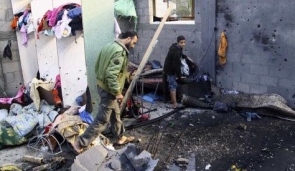
The Israel Defense Forces released a statement saying that the air force had fired on a group of terrorists in the northern part of the Strip that were about to launch a Grad rocket at Israel. Israel has stepped up strikes against Gaza militants in response to a surge in rocket and mortar fire at Israel in the past few days.
The IDF said Palestinian militants had launched mortars against Israeli troops earlier on Tuesday and the military shot mortars at the source of the firing.
Palestinian medics said the dead youths from the first attack were aged 12, 16 and 17. The 58-year-old owner of the house was also killed.
Lt. Col. Avital Leibovich, an IDF spokeswoman, said the army did not know that civilians were in the area at the time of the strike and stressed that Israel had no desire to raise tensions and hoped that Hamas also didn’t have that intention. “We never operate when civilians are identified,” she said.
Locals said four Israeli tank shells struck the building east of Gaza City.
Israel hit a series of Palestinian militant targets in the Gaza Strip earlier Tuesday, damaging smuggling tunnels and suspected weapons sites.
Palestinian officials said 19 people were wounded in those attacks.
On Saturday, southern Israel was hit by over 50 rockets, of which Hamas claimed responsibility for 10. The Israeli Air Force struck Gaza targets in retaliation for the bombardment.
On Monday, an IAF fighter jet struck a Gaza tunnel running along the border with Israel, as well as Hamas militants in the northern Gaza strip, an IDF statement confirmed.
The IDF spokesperson’s office released a statement saying that the Gaza tunnel was used to smuggle terrorists into Israeli territory with the intent to execute attacks against Israeli citizens.
Libya and the suspicious rush to war: The Guardian
After many more deaths we are likely to see the partition of Libya – why has there been such a consensus for this military action?
A French Mirage 2000 jet fighter after returning from a mission over Libya. Photograph: ECPAD/HO/EPA
The House of Commons is debating the government stance on UN resolution 1973, having been invited to give its approval or withhold it. It’s a bit late, as the prime minister made a statement to the Commons on Friday and within 24 hours the bombing had started. We are presented with a fait accompli.
The debate, however, takes place against a background of growing concerns about the nature of the military operation, the intensity of the air strikes, the implications for the whole region, and the real motive behind the Arab League in calling for this in the first place. India is the first country to publicly call for a cessation of air strikes. Others are likely to follow.
UN security council resolution 1973 was heavily trailed as a no-fly-zone resolution. Like most UN resolutions it is very long. It specifically welcomed the appointment of the UN special envoy Abdel-Elah Mohamed Al-Khatib and in its proposals under chapter 7 of the UN charter (mandatory for all member states) demanded a ceasefire, stressed the need to find a solution to the conflict through the UN special envoy, and demanded that the Libyan authorities fulfil their international obligations under humanitarian law.
It’s not until one reaches point 6 of the resolution that the no-fly zone is mentioned, and even then it requests the secretary general to inform the security council of any actions taken in support of the no-fly zone. The rest of the resolution talks of the arms embargo, the asset freeze and the appointment of a panel of experts to consider the operation of this resolution and the implications for international law. The attacks on Libya take place with no assurance that depleted uranium weapons will be banned from the operation and come only a few weeks after Britain stopped trading with Libya and training Libyan security officials.
I welcome the popular demands all across the region, including Libya, for accountable government and an economic strategy that provides full employment for the burgeoning young populations. But abuses of human rights by Gaddafi’s government didn’t start three weeks ago, as any one of the Libyan opposition will attest, and a blind eye was turned to this when Libya said it was no longer developing weapons of mass destruction and British oil companies were encouraged by Tony Blair to strike long-term agreements.
The most likely outcome of this ghastly period is many more deaths, the long-term effects of depleted uranium (if it is being used), and the partition of Libya. With this strategy it is quite conceivable that the east of Libya will be partitioned into a client state centred upon Benghazi, and the west will be a pariah state led by Gaddafi.
One can’t help but be struck by the rush to military involvement by politicians of all countries and all persuasions. The contrast with the western treatment of the rest of the region could not be more stark. The Palestinian people have lived with occupation for 60 years, well over 1,000 died in Gaza during Operation Cast Lead, settlements abound and Israel possesses nuclear weapons. I can’t remember anyone calling for a no-fly zone in Gaza in winter 2008-09 when phosphorous bombs were used against a largely unarmed and defenceless civilian population.
Saudi Arabia is the world’s biggest oil exporter, and the biggest importer of arms from Britain and other countries. The importance of Saudi Arabia to western economic interests cannot be overstated, otherwise why would Blair take such an extraordinary decision as to suspend the Serious Fraud Office investigation into the BAE contracts with Saudi Arabia? Britain is up to its neck in supporting the Saudi monarchy with all the denial of human rights and aggression that the regime has shown toward its opponents. Saudi armed forces have crossed into Yemen in recent times, and last week entered Bahrain to support the king in his suppression of democratic protest.
News today of huge demonstrations and growing isolation of the Yemeni president, Ali Abdullah Saleh, looks like almost a replay of what happened in Tunisia. I asked a young activist in Tunis just a few weeks ago if their revolution was asking for western help, his reply was: “No, we will do it ourselves; the problem with the west is, it never knows when to leave.”
A blow to Israeli Arabs and to democracy: Haaretz Editorial
Extremists are counting on those Knesset members who ignore the inflammatory and racist context from which recent bills arise, and who don’t discern their destructive consequences.
Two or three bills are to be voted on by the Knesset today on second and third reading, each of which is inappropriate in its own right. Taken together, however, just prior to the Knesset’s spring recess, they represent a discordant and worrying summation of the current Knesset session.
The so-called Nakba Law has deliberately vague wording. It would bar entities receiving public funding from organizing or themselves funding any activity “which would entail undermining the foundations of the state and contradict its values.”
Judging by the worldview of MK Alex Miller (Yisrael Beiteinu ), who initiated the legislation, such a definition is liable to apply to academic conferences and historical research and discussion focusing on various aspects of the War of Independence and the events preceding it. In essence, this is a law designed to shut people up.
The proposed law regarding resident admissions committees in certain small communities has undergone changes and has purportedly been softened. The maximum number of residents in the communities to which it would apply has been lowered to 400 and its application has been limited to the Negev and the Galilee. It is an outrageous bill, which would crudely trample the principle of equality and would limit Arab citizens choices of where to live.
An amendment allowing for the revocation of citizenship of those convicted of espionage or aiding terrorism, which was approved by the Knesset’s Interior and Environment Committee, encourages state abuse of power and would transform citizenship from an obvious right to a fragile privilege that the state can revoke at will.
The initiators of the bill have promised that they will attempt to pass the law before the end of the Knesset’s winter session, although even Shin Bet security service officials have argued that revocation of citizenship is a dangerous weapon that is liable to escalate tensions between Israel’s Arab citizens and the state.
It’s possible that such escalation is precisely what the initiators of the bill, both from Yisrael Beiteinu, want; in the constant battle between Prime Minister Benjamin Netanyahu and Yisrael Beiteinu, Arab citizens serve as a convenient punching bag.
The extremists, however, are also counting on those Knesset members who ignore the inflammatory and racist context from which these bills arise, and whom don’t discern the bill’s destructive consequences.
In advance of the vote, each Knesset member must therefore ask himself whether he is ready to take part in a process that will bring Israeli democracy to the edge of the abyss, or whether he will instead foil such a step.
UN: Gaza’s youth ‘denied higher education’ by Israeli blockade: The Guardian
Medicine and engineering among sectors in desperate need of funds and equipment
Youth in the Gaza strip lack educational and employment opportunities thanks to Israel’s blockade, says the UN. Photograph: Kevin Frayer/AP
The next generation in the Gaza Strip may be less educated, less professional and perhaps more radical because an Israeli blockade has restricted educational and employment opportunities, say UN and other sources.
The four-year blockade has particularly affected youths aged 18-24, limiting access to higher education, academic exchanges and professional development, says Gaza’s education ministry. About 65% of Gaza’s 1.6 million people are under 25, according to UN estimates.
“Higher education in all its forms is absolutely critical to a functioning society and the creation of a future Palestinian state,” UN humanitarian coordinator for the occupied Palestinian territory Max Gaylard told IRIN, and “to maintain a necessary level of skills in professional sectors, like medicine and engineering.”
Gaza’s unemployment rate – nearly 50% according to the Palestinian Central Bureau of Statistics (PCBS) – indicates dire prospects for the rapidly growing and youthful population.
The economic blockade, imposed by Israel after the Islamist movement Hamas took control of Gaza, has obstructed the import of books, science laboratory and other educational equipment to Gaza, according to the Unesco. Israel allows in limited humanitarian supplies.
The lack of facilities, new information and experiences has caused a marked deterioration of Gaza’s whole educational system. Noor, an English education student at Al-Azhar University, ranked second in Gaza, said she lacked essential books for her coursework and even chairs were missing from lecture halls.
“Our universities are not ready for new generations,” she said. “We only have one laboratory and two computer labs, and it is not enough.”
Enrolment levels at Gaza’s 14 public and private universities and colleges remain high, but conflict and the stringent blockade have seriously undermined access to, and the quality of, higher education, said UNESCO in a report.
According to the Palestinian Centre for Human Rights in Gaza (pdf), “Under the policy of complete closure imposed since June 2007, Palestinians from Gaza who once constituted some 35% of the student body at universities in the West Bank are virtually absent from West Bank education institutions.”
The development of two separate systems due to the Israeli-imposed movement restrictions meant fewer subjects and facilities for Gaza’s university students, said UNESCO.
About 80% of the Gaza population is aid dependent, according to the UN Office for the Coordination of Humanitarian Affairs (OCHA), and higher education institutions in Gaza are feeling the financial strain.
According to Unesco, students are increasingly unable to pay tuition fees, resulting in drop-outs and postponement of studies.
The inability of students to cover fees has hit Gaza universities hard, since student fees provide about 60% of university running costs, according to Palestinian NGO Sharek Youth Forum (pdf).
“The level of education is being compromised and we have trouble hiring qualified professors and staff,” said Kamalain Shaath, president of the Islamic University, ranked top in Gaza and the West Bank. Half the students at the university, he added, were unable to meet tuition requirements this semester.
Islamic University’s first medical school class of about 50 promising young doctors will graduate this spring, and will be desperately needed in this conflict area, although the university science labs – destroyed during Israel’s 2008-2009 Operation Cast Lead that aimed at ending rocket attacks into Israel – were never rebuilt.
Seven universities and colleges were damaged during the offensive, which ended in January 2009, with six buildings fully destroyed and 16 partially, according to Unesco. As of March 2011, rebuilding has not been possible thanks to the embargo on building materials.
Overcrowding in schools is another problem. About 80% of Gaza’s public schools operate on double shifts, according Gaza’s education ministry director-general, Sharif Nouman. In 2010, only three new schools were built due to lack of building materials, yet another 100 need to be built, he said.
Meanwhile, the internal conflict between Palestinian factions Fatah and Hamas is putting pressure on the education system, thanks to a lack of communication between the Gaza and West Bank ministries, he added.
The unemployment rate among those aged 15-19 is about 72%, while unemployment affects 66% of those aged 20-24, according to a report in January by the Office of the UN Special Coordinator for the Middle East Peace Process (UNSCO). West Bank unemployment rates were 29% and 34% for these age groups, respectively.
When young people graduate they have almost no opportunity to find a job in a company or association. About 70% of industrial establishments in Gaza have closed under the blockade, according to OCHA, while 120,000 private sector jobs were lost in the first two years of closure. A recent easing has allowed the limited export of cut flowers and strawberries from Gaza to Europe.
“When young people graduate they have almost no opportunity to find a job in a company or association,” said Bassam, a multi-media student at Al-Azhar University. Some try to start their own businesses, but “this cannot succeed in Gaza now because of the blockade,” he added.
UN officials in the region have expressed concern that isolating youth in Gaza from broader values and opportunities will backfire. “A rapidly growing society, becoming poorer, that is subject to restrictions on education will encourage extremism in its worst forms,” warned Gaylard.
Deputy director-general of the Israeli ministry of public diplomacy, Danny Seaman, however, said: “Hamas uses access to Israel to perpetrate terror attacks against our civilians and this immediate threat outweighs the concern over increased militancy amongst youth in Gaza.”
Some 71% of university students surveyed by UNESCO reported (pdf) they were not hopeful about the future and almost the same number worried there will be another war.
“Most of my peers want to emigrate,” said Shadi, a 26-year-old physical therapist in Gaza City. “We are isolated and frustrated.”
Netanyahu: Palestinians are not ready for peace with Israel: Haaretz
The prime minister slammed the opposition for saying that they were close to reaching a peace deal with the Palestinians at one point.
Prime Minister Benjamin Netanyahu slammed claims by the opposition that they had at one time been close to a peace deal with the Palestinians, saying “Palestinians are not ready for peace with Israel.”
Speaking to the Knesset on Tuesday, Opposition head Tzipi Livni said that Kadima had at one point been close to reaching a peace deal with the Palestinians.
The prime minister responded to Livni’s comments, saying “According to Palestinian publications, they demand the dismantling of Har Homa, Ariel, and Ma’ale Adumim. I assume that you in Kadima are against this. If you are against this, I want to know, where was the agreement?”
Har Homa, Ariel and Ma’ale Adumim are all large West Bank settlements that would be difficult to dismantle if a peace deal was reached with the Palestinians. It has been suggested that instead of dismantling them, Israel would keep them in exchange for giving the Palestinians additional land.
Netanyahu referred to the opposition’s position on refugees saying “I heard from the opposition chair a stance that I completely agree with: not one refugee. So they agreed to this? You were so close?”
If there wasn’t an agreement made with the Palestinians, Netanyahu said, then why does Kadima “attack the government all the time when you know the truth: that you were far from reaching an agreement.”
Military Intelligence monitoring foreign left-wing organizations: Haaretz
IDF officers say special department has been created to monitor left-wing groups that the army sees as aiming to delegitimize Israel; department will work closely with government ministries.
Military Intelligence is collecting information about left-wing organizations abroad that the army sees as aiming to delegitimize Israel, according to senior Israeli officials and Israel Defense Forces officers.
The sources said MI’s research division created a department several months ago that is dedicated to monitoring left-wing groups and will work closely with government ministries. In recent weeks, the head of the new unit has been taking part in discussions in the Prime Minister’s Office about how to prepare for the possible arrival of a Gaza-bound flotilla in May.
The undefined and potentially broad scope of such a venture, which IDF sources say is focusing on how to respond to maritime convoys aimed at breaching Israel’s Gaza blockade, has some Foreign Ministry officials concerned that the army is overreaching.
“We ourselves don’t know exactly how to define delegitimization,” said one ministry official. “This is a very abstract definition. Are flotillas to Gaza delegitimization? Is criticism of settlements delegitimization? It’s not clear how Military Intelligence’s involvement in this will provide added value.”
Military Intelligence officials said the initiative reflects an upsurge in worldwide efforts to delegitimize Israel and question its right to exist.
“The enemy changes, as does the nature of the struggle, and we have to boost activity in this sphere,” an MI official said. “Work on this topic proceeds on the basis of a clear distinction between legitimate criticism of the State of Israel on the one hand, and efforts to harm it and undermine its right to exist on the other.”
The new MI unit will monitor Western groups involved in boycotting Israel, divesting from it or imposing sanctions on it. The unit will also collect information about groups that attempt to bring war crime or other charges against high-ranking Israeli officials, and examine possible links between such organizations and terror groups.
MI decided to create the unit in the wake of investigations of Israel’s deadly takeover in May 2010 of a maritime convoy aimed at breaking the Gaza blockade, which found that the country’s intelligence agencies failed to provide information that could have helped Israel adequately prepare for the violent resistance that naval commandos encountered aboard the Mavi Marmara.
The unit’s other spheres of responsibility have yet to be clearly defined, but are expected to involve pinpointing the subjects that Israel’s other intelligence agencies should investigate, sources said.
The quality of intelligence information about groups aimed at delegitimizing Israel has improved and the quantity has increased in recent months, said an official in the Prime Minister’s Office.
“There is a demand for such information,” he said. “Officials need information on such topics, and it hasn’t always been available in the past, because there was a lack of awareness pertaining to this topic in the intelligence community. The new unit’s orientation will be to collect information and carry out intelligence research for the Foreign Ministry and other government ministries.
The unit has the support of Brig. Gen. (res. ) Yossi Kuperwasser, the director general of the Strategic Affairs Ministry and a previous head of MI’s research division. During the second intifada, he pushed for the intelligence community’s large-scale involvement in public advocacy and diplomatic matters, a stance that was criticized by other MI officers.
Aid industry doing no harm in Palestine?: The Electronic Intifada
Samer Abdelnour, 22 March 2011
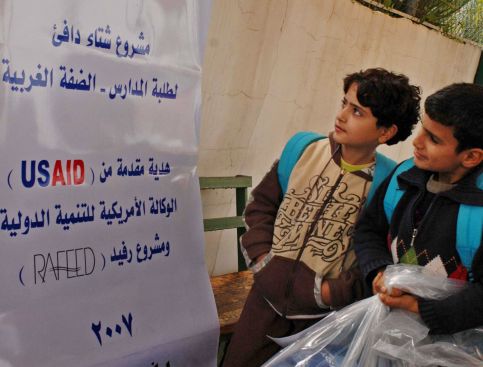
The “Palestine Papers” reveal fully the extent to which Palestinians have neither genuine leadership nor a partner for peace. At the foreground is an unrepresentative “authority” prepared to compromise the most fundamental of Palestinian aspirations for an unrelenting colonizer and its imperious supporter. In the background lies a key mechanism enabling Palestinian deprivation: the aid industry.
Palestinians are among the most aid-subsidized people on earth. Anne Le More’s International Assistance to the Palestinians after Oslo demonstrates how $8 billion of post-Oslo aid made its way to the occupied West Bank and Gaza Strip between 1994 and 2006 for the purposes of development, building Palestinian Authority capacity and increasingly for emergency relief operations. Much of this, it was claimed, was needed to build the institutions necessary for a two-state peace process and to support socioeconomic development.
However, the aid industry is a key factor in Palestinian de-development. Discourses of “aid,” “development” and “reconstruction” shield Israel’s ongoing occupation and colonial project. A full third of the Palestinian Authority budget is aid-subsidized. In addition to funding a distorted Palestinian political system, the aid industry directly removes from Israel the burden of responsibility for the destruction of Palestinian lives, livelihoods and infrastructure. In doing so, it allows Israel to focus its resources and efforts on the acceleration of Palestinian poverty, the expansion of settlements, the expropriation of Jerusalem and the destruction of Gaza.
The blinders through which most aid industry actors operate serve to de-politicize and de-contextualize Palestinian “poverty.” This was evident at a presentation by a representative of a large UN aid agency at a London-based university in late 2010. The presentation outlined a number of initiatives to feed destitute Palestinians and energize the economy of the West Bank, some being replicas of the organization’s work in sub-Saharan Africa and South Asia.
After the presentation, the moderator made clear that the presenter represents an “apolitical” agency and thus would “not field political questions.” Of course, members of the audience could not resist the temptation to ask “political” questions, probing the possibility that de-politicizing aid plays a role in supporting and expediting Palestinian de-development. To this, the presenter posed a troubling dilemma: “Aid saves Palestinian lives.” Surely, it is not enough for aid to “save” Palestinians from their own “poverty,” so that they can continue to endure a devastating occupation and brutal dispossession. Must the choice be starvation on one hand, and on the other, a marginal survival with the dissipation of national aspirations for self-determination and the right of return?
The agency in question is representative of a majority, but not all, of the international aid organizations, agencies and donor projects servicing Palestinians.
By contrast, two international organizations manage to fulfill significant mandates without de-politicizing their work. The first is the UN agency for Palestine refugees (UNRWA). Writing on the UNRWA-Palestinian relationship, Randa Farah discusses the way in which the UN agency “is of vital importance to the Palestinian national struggle” (“Uneasy but Necessary: The UNRWA-Palestinian Relationship,” Al-Shabaka, 30 November 2010). UNRWA upholds its obligation to UN resolutions as a mechanism for maintaining Palestinian refugee visibility and collective memory, and as an organization embodying the mandate for refugee rights in absence of a functioning national Palestinian consensus. Of course, in the absence of a final settlement, UNRWA does play a significant role in supporting the limbo in which millions of Palestinian refugees exist.
In stark contradiction to UNRWA’s mandate is the support provided to Israel by its largest donors, the United States and the European Commission. The US is UNRWA’s largest donor ($268 million in 2009), and Israel’s largest trading partner and provider of blind political and military support. Next is the European Commission ($232.7 million in 2009), which plays a significant role in Israel’s economy and supports Israeli military research. Together, US and EU support amount to over half of UNRWA’s annual funding. Within the confines of this donor-UNRWA mandate contradiction, UNRWA attempts to operate with full acknowledgment of the political reality and context in which it works. Importantly, it maintains elements of Palestinian rights and aspirations as part of its core mandate.
Next, the Rosa Luxemburg Foundation (RLF) recognizes that the institutions of foreign aid create dependencies where local organizations are unable to exert and promote their own agendas and aspirations. RLF explicitly acknowledges the decades-long failure of the aid industry, and that Palestinian social, economic, and institutional capacity will continue to erode without the support of grassroots and progressive political organizing as well as a Palestinian-owned development agenda.
A large number of Palestinian civil society organizations and individuals embody the aspirations of their people through the peaceful boycott, divestment and sanctions (BDS) movement. Those who support BDS refuse the colonial project of economic normalization and demand a forum through which to express their socioeconomic and political aspirations. In harmony with BDS standards, international aid organizations too must consider the role they — and their donors — play in driving Palestinian de-development.
The aid industry in Palestine must choose between either the blind subsidizing of oppression, or a recognition and cessation of its support for it by adopting Mary B. Anderson’s Do No Harm framework — an approach for analyzing the interrelations between international aid in conflict contexts and the dynamics of those conflicts — as well as codes of ethics developed by the UN, bilateral donors and international and national nongovernmental organizations. Subsidizing a brutal occupation and illegitimate authority translates into the deliberate crushing of Palestinian aspirations and hence the very tools for creating lasting peace. As the world has witnessed through the “Palestine Papers,” when aid is de-politicized, donors and international organizations are able to pour billions of dollars into a colonial project under the masks of institution building and poverty reduction. Standing in stark opposition to the stated objectives of aid to Palestinians is the reality of subjugation so clearly evoked in Malcolm X’s “Message to the Grassroots”: the facade of a government pandering to an uncompromising colonial project bent on the destruction of Palestinian human rights and national aspirations.
As a first step out of this inadvertent (or intended) collaboration, well-meaning aid workers should embrace the Do No Harm framework within their organizations to ensure that their work does not simply serve to “rebuild” what Israel deliberately destroys. Aid organizations and agencies must seriously rethink the claim that their work is “apolitical,” should immediately publicize the extent of potential harm caused throughout their chain of operations and outline a transparent action plan for eliminating potential harm in their work. Areas for consideration include: securing funds from donor countries that support Israeli military or economic activity, objectifying Palestinian “poverty” through literature and marketing materials, working through or with Israeli state agencies and explicating how aid is employed in relation to Israeli policy and military activity.
Aid agencies must attempt to hold Israel politically, fiscally and morally accountable for past and ongoing destruction rather than contributing to the creation and perpetuation of an illusory Palestinian leadership and Palestinian de-development. Otherwise, massive aid subsidies under the masks of “development,” “reconstruction” and “institution-building” make the aid industry complicit in the deliberate devastation of the people it claims to serve.
Samer Abdelnour is completing a PhD in Management at the London School of Economics. His doctoral research examines nongovernmental organizations and humanitarian response, and the role of community and collective enterprise in postwar peace-building and development in Sudan. A version of this essay was first pubilshed by Al-Shabaka, the Palestinian Policy Network.
Village of Awarta faced mass arrests, violence and massive destruction during five days of curfew: Palsolidarity ISM
Posted on: March 20, 2011
19 March 2011 | International Solidarity Movement
During the five day curfew in the village of Awarta, south of Nablus, the Israeli military raided homes and detained around 300 people, the youngest 14 years old. Some of the men were taken to the local boy school were they had to leave their finger prints and DNA and some were taken to the military base at Huwwra checkpoint. According to mayor, Qays Awwad, 55 men are still in Israeli custody. Some of the detainees reported that they had been abused by the soliders while they were detained and handcuffed. It has been reported that a 75 year old woman was handcuffed and had to sit on the ground while the soliders went through her home, and that an 80-year-old woman was beaten by soliders.
Three scandinavian ISM activists were in Awarta during the five day curfew, from saturday afternoon until wednesday noon. From the roofs of people’s houses they witnessed how the Israeli soliders went into homes, arrested men and made the familes wait outside while they raided their homes resulting in large scale damage to property. The ISM activists also visited homes that soldiers had searched to find broken windows, cut fuse-cables, smashed furniture, and polluted drinking water caused by Israeli soldiers.
Hundreds of soldiers entered the village in military vehicles early on the morning of the 12th of march, following the murder of five members of a settler family in the nearby illegal Israeli settlement of Itamar. According to the soliders, they were searching for the murderer and would continue until they found one. One soldier told ISM activists, ”we will search this village until we find someone.” In the process of ”searching” the houses the sodiers damaged framed pictures, funiture, Tv-sets, gasheaters, smashed holes in floors and walls, stole money and jewlery, and poured liquids over computers. The Israeli forces occupied around 30 houses to sleep in during the four nights they remained in Awarta. In some of the houses they evicted the families who had to seak shelter outdoors or in neighbours homes during the night; in others they forced the families to stay in one room as the soldiers occupied the rest of the house. In occupied houses the sodiers deficated in the rooms and used the famlies bed sheets as toilet paper.
Alot of the houses were ”searched” and wrecked up to three times over five days. The soldiers did not seem to follow any apperent pattern when choosing which house to search or who to arrest, ”It all looked very random ” one activist said. In at least one case, on monday the 14th of march, the soldiers still did not know the name of the man that they had previously arrested and had to ask his family for it. The man that they had arrested was village council member Salim Qawaric. Approxametely 25 soliders entered his house causing severe damage on the family’s property while the family had to wait in the backyard. The following day the soldiers came back and searched the home once again resulting in further damage to the family’s home and property.
The ISM activists were not allowed to take pictures, and when they did it anyway, they soldiers pointed their guns at them shouting: ”Do not take pictures!” One of the activists had her memory card stolen by a soldier who took her camera from her by force.
During the curfew many families ran short of gas, food, water and medicine.
There have been numerous reports of physical abuse. According to eyewitnesses, Mashmod Zaqah, 28, had his hands cuffed behind his back and was blindfolded before he was beaten by at least six soldiers during a period of two hours, periodicly he lost consciousness and couldnt feel his legs or fingers. His family managed to smuggle him to Rafidia hospital in Nablus. He suffers a dislocated shoulder, back injuries, and a badly twisted ankle.
Accourding to eyewitnesses, around 300 israeli settlers, of whom some were masked, entered the village on saturday the 12th of March and threw stones at windows, injuring two Awarta residents by breaking their arms. Villagers tried to protect homes while israeli soldiers responded by shooting teargas at the villagers.
It has been reported that children were bitten by the israeli military dogs that the soldiers had with them. A young physically disabled man was bitten by a dog which resulted in his hospitalisation. Loay Medjet Abdet is now scared to go inside his own home because he believes the dogs will attack him again.
For the activists, it was clear that the repression against Awarta was only a form of collective punishment. When one activist asked: ”Why do you have to punish all this people?” The solider responded with: ”We have to punish these people so they will understand.”
Even though this kind of systematic collective punishment is illegal according to International law, is it frequently used by the Israeli military all over the West Bank and in Gaza.
When medical vehicles tried to access the area they were stopped by Israeli forces. ISM activists went to the checkpoint near Awarta on March 15 and reported that ambulances were being held several hours before they could enter the village. As an occupying force, Israel is obligated under article 56 of the Geneva Conventions not to hinder the work of medical personnel in a conflict zone.
Jerusalem’s bookseller to the stars facing deportation: Haaretz
Munther Fahmi, a Palestinian, was born in Jerusalem and lived there until he was 21, when he left for the United States for 20 years.
By Nir Hasson
Munther Fahmi is a well-known figure in Jerusalem’s diplomatic community and among the city’s foreign press corps. A visit to his small bookstore at the American Colony Hotel is a must for anyone seeking to immerse himself in the roots of the Arab-Israeli conflict. Among his many and well-known patrons are ambassadors, authors and politicians, including former U.S. President Jimmy Carter and European Union foreign policy chief Catherine Ashton.
But it appears all the connections in the world are no match for Israel’s Interior Ministry, which is now seeking to have Fahmi deported.
Fahmi, a Palestinian, was born in Jerusalem and lived there until he was 21, when he left for the United States for 20 years. He married in the U.S. and acquired an American passport.
He visited Israel often and ultimately returned to Jerusalem to live in 1993, though his Israeli residency rights were revoked in the interim.
Like most Arab residents of East Jerusalem who chose not to apply for Israeli citizenship, Fahmi had Israeli residency, but not citizenship. Residency is automatically revoked in the event of an absence of many years or the acquisition of citizenship from another country.
Over the past 17 years, Fahmi has entered and left Israel using his American passport and was generally here on a tourist visa. Whenever the visa expired, he would leave the country and reenter so that it would renew.
A year and a half ago, however, Fahmi was informed by the Interior Ministry that his visa would no longer be renewed and he should leave the country permanently.
All of his requests to reconsider in light of the fact that his family and his business are in Jerusalem were turned down. He also filed a petition to the High Court of Justice seeking legal status here.
The three-judge panel suggested that he withdraw his petition and seek permanent resident status through an inter-ministerial humanitarian committee, which has the authority to consider factors beyond the letter of the law. The court also suggested that Fahmi’s lawyer had raised other issues that the Interior Ministry would consider.
His lawyer cited evidence that the center of Fahmi’s life was in Israel and that this could be attested to by a number of Israeli institutions here, including Haaretz and the Steimatzky bookstore chain.
The Interior Ministry said in response that the matter had been considered by the High Court of Justice and that they accepted the state’s position at that time.
Since then, there have been no new developments, the ministry said, adding that if Fahmi files a request to the inter-ministerial humanitarian committee, the matter will be handled according to procedure.
“One way or another,” the ministry said, “what was provided up to this point was a letter sent less than a week ago, and it will be dealt with, as stated in accordance with procedures.”
A petition to Interior Minister Eli Yishai that has been circulated on Fahmi’s behalf has been signed by hundreds of people, including journalists, publishers and academics. The petition notes the importance of Fahmi’s bookstore as a meeting place for authors, diplomats, journalists and others.
US promoting arms trade mission organized by settlement firm: The Electronic Intifada
Jimmy Johnson, 18 March 2011
The United States Department of Commerce and the US embassy in Tel Aviv are co-promoting the Israel Unmanned Systems 2011 trade mission from 27 March to 1 April. Their partner — and the primary organizer — is Airlift, inc., an aerospace and consulting firm based in the settlement of Talpiot Mizrach (East Talpiot) in occupied East Jerusalem. This raises troubling questions about why Washington is promoting the Israeli arms trade and why it is doing so with a firm based in an illegal colony which explicitly contradicts official US policy as well as international law.
Airlift was founded in 2007 by Marc-Philippe Rudel, a French-Israeli electrical engineer and businessman, to “promote economic cooperation and the establishment of global partnerships.” The company brings foreign arms industry and military officials to Israel for arranged business-to-business meetings, specially tailored seminars, industry workshops and visits to major Israeli armament firms and research institutes. Airlift’s website states that its “offices are located in the heart of Jerusalem” but the address given puts them in occupied East Jerusalem. Airlift’s Spanish subsidiary, Airlift Iberia, was established in September 2010.
Though considered a mainstream Jerusalem neighborhood by most Israelis — including Rudel, judging by his activism in the secular liberal/centrist “Awakening in Jerusalem” movement — East Talpiot is unanimously considered an illegal settlement by the international community including the United Nations, the International Court of Justice and the US government whose pronouncements consistently oppose Israeli settlements. However, Washington regularly takes actions — such as the recent veto of a UN Security Council resolution condemning settlements — to shield Israel from international condemnation and formerly contributed economic aid that was used directly for settlement infrastructure and construction. Promoting a trade mission with a firm based in a settlement points to the latter as being more representative of US policy, in spite of official pronouncements to the contrary. American sponsorship comes at a time when governments like Norway, the Netherlands and the United Kingdom are actively distancing themselves from settlement-related businesses. Requests for comment from the US State Department and Department of Commerce were not answered.
The trade mission’s program includes visits to the facilities of several Israeli arms manufacturers deeply involved in the occupation. Israel Aerospace Industries, Aeronautics Defense Systems, BlueBird Aero Systems and Rafael Advanced Defense Systems are all on the schedule for the visiting delegation as well as an “upscale” reception at the US embassy in Tel Aviv. There will also be panels on the market for unmanned systems (drones) and an optional tour on the last day through the occupied Old City of Jerusalem.
Israel is a world-leader in the design and export of unmanned systems, especially unmanned aerial vehicles (UAVs). It also deploys them extensively in the occupied West Bank and Gaza Strip and over Lebanon. This battlefield experience, the history of deployment in service of military occupation, is a key marketing aspect for the tools. The website for the trade mission notes, for example, that BlueBird Aero Systems is an “official supplier of the Israeli Ministry of Defense and Israeli Air Force.”
There is already a history of partnerships between Israeli UAV manufacturers and American arms and aerospace firms, some of which pre-date Airlift’s founding. Boeing, AAI and General Dynamics have all signed marketing agreements to promote Aeronautics Defense Systems models in the US. General Dynamics also helps promote Elbit Systems models, and Advanced Ceramics Research and Cubic Advanced Tactical Systems formerly helped market Rafael’s now-discontinued Skylite drone. These firms and others are also engaged in research and development for their own production of UAVs. It is only the US arms industry’s UAVs, in fact, which compete with those from Israel.
This is also not Airlift’s first joint mission with the US Department of Commerce. In January 2010, they jointly organized and promoted the Israel Space 2010 Trade Mission which brought participants from Brazil, Belgium and the US to learn about and engage with many of the same arms manufacturers involved in the pending Unmanned Systems mission. Airlift regularly participates in trade and aerospace events promoted by the French, Brazilian, Canadian and other embassies. Rudel too is a consultant in charge of the aerospace industry sector for the Economic Mission of the Embassy of France.
The promoters are well aware that the same battlefield experience that gives Israeli UAVs a marketing edge is also a potential liability. A document from the 2010 Space Trade Mission available on the US Department of Commerce’s BuyUSA.gov website notes that “geo-political concerns” are “potential obstacles” to Israeli firms tapping international markets more successfully. A recent example of this was Brazil’s hesitancy in buying Israeli UAVs, as revealed by Wikileaks. The 2009 US diplomatic cable notes that Brazilian Defense Minister Nelson Jobim prepared arrangements to “prevent Brazil [from] having to buy UAVs from Israel, which had become politically sensitive” (15 January 2009 diplomatic cable, Wikileaks). With the increasing activity and popularity of the boycott, divestment and sanctions efforts aimed at ending the occupation, perhaps “potential obstacles” to future sales will prove more formidable.
Jimmy Johnson lives in Detroit and runs www.NegedNeshek.org, a news, data and analysis project researching Israeli arms exports. He can be reached at jimmy [at] negedneshek [dot] org.
Egypt in strong position to raise gas price to Israel: Minister of Petroleum: Ahram Online
Subsidies are the target of new Egyptian minister of petroleum’s agenda, due to popular support; Israel gas subsidies are on the negotiation table but local subsidies are untouched
Monday 21 Mar 2011
Egypt is in a strong position to raise gas price to all importers, Minister of Petroleum, Abdallah Ghurab stated on Monday in a press conference.
Ghurab revealed that Egypt is negotiating with Jordan and Israel to raise export prices. Currently, they receive a generous below-market discount on gas from Egypt, which Egyptians resent, particularly with regard to Israel.
“Public opinion and pressure supports the difficult negotiations we are leading now with Israel” stated Ghurab. The minister declined, however, to unveil the current price of Egyptian exported gas.
He did promise to bow to public opinion by changing the price of gas and announcing shortly an index price. “This will affect our contracts with other importers,” he nailed the point.
Egypt exports 4 per cent of their gas to Israel, according to figures released in the press conference by the head of petrol authority, who was appointed ten days ago.
Regarding local subsidies, the minister of petroleum vows to keep the price of gas barrels untouched at LE3, but says, grudgingly “…I find it strange that consumers pay LE15 a barrel to a private trader but refuse to allow the government to raise its original price by [even] one pound.”
Ghurab calculates that the energy subsidy bill, which is currently budgeted at LE72bn will rise by LE10bn to LE82bn, due to a hike in international oil prices.
Egypt produces 700 thousand barrels a day and 6.3m cubic metres of natural gas. “If all of this was sold at market price the government would be rich,” he says. Nevertheless, subsidies will remain untouched “because this is a sovereign decision,” rather than economic one.
Energy subsidies in Egypt are criticised as it benefits the rich more than the poor.

